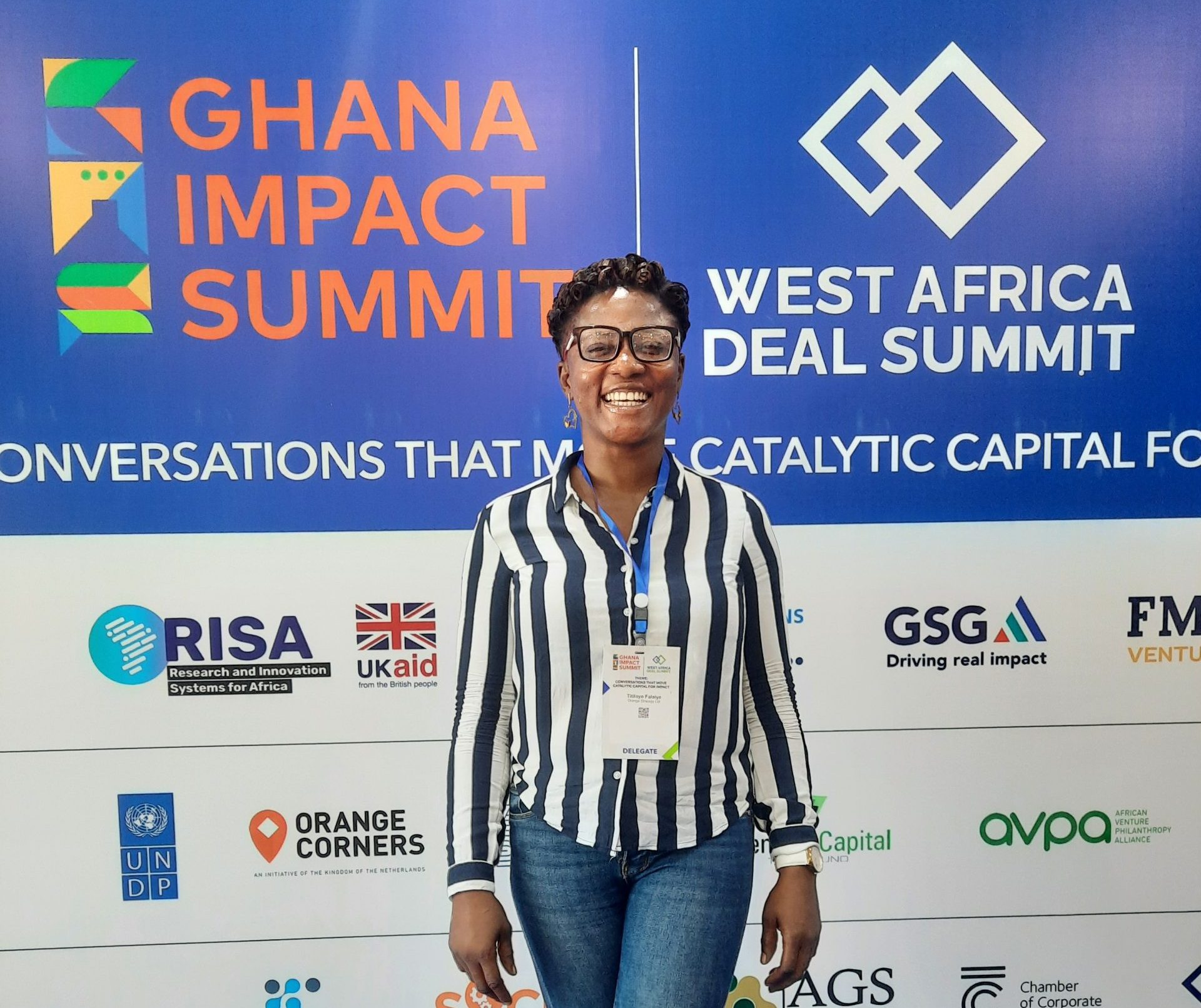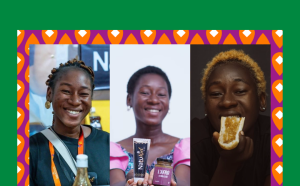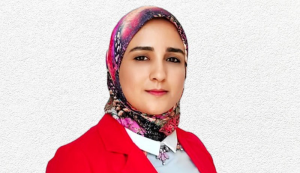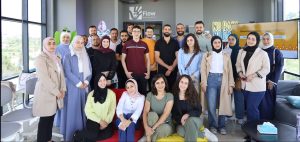“Indiscriminate disposal of waste is a major issue in Nigeria and Africa at large”, says Titilayo Falaiye. Her passion for proper waste management led her from cleaning sewers and developing radio programmes to ultimately establishing her own waste management firm. With Orange Strategy Limited, she’s working on closing the loop for plastic recycling. Our travelling reporter sat down with Titilayo at the West Africa Deal Summit, where she was part of our Ghanaian-Nigerian delegation of alumni.
Hi Titilayo, lovely to have you with us here! To start, could you briefly introduce yourself?
My name is Titilayo Falaiye and I’m the CEO and founder of Orange Strategy Limited, a Nigerian waste recycling firm. Orange Strategy addresses a common practice in Nigeria: indiscriminate waste disposal. People practically dump their waste on roadsides and in the drainage system. I’m very passionate about waste management, so I decided to go all out to educate the public about the hazards of the indiscriminate disposal of waste and the importance of proper waste management.
Honestly, this is just me doing what I love to do. I’ve been advocating for proper waste management since I was 14, 15 years old. I was already cleaning my street back then, cleaning the drainage system. I studied economics at the university, and after I graduated I worked in the media. Back then I created a 15-minutes radio drama, which was not only entertaining but also informative. And I used that programme to let the public know that we had to put a stop to the indiscriminate disposal of waste. We only have one earth and we have to be responsible when it comes to waste management. Because if we don’t properly dispose of our waste, we’re all going to have to pay very dearly for it.
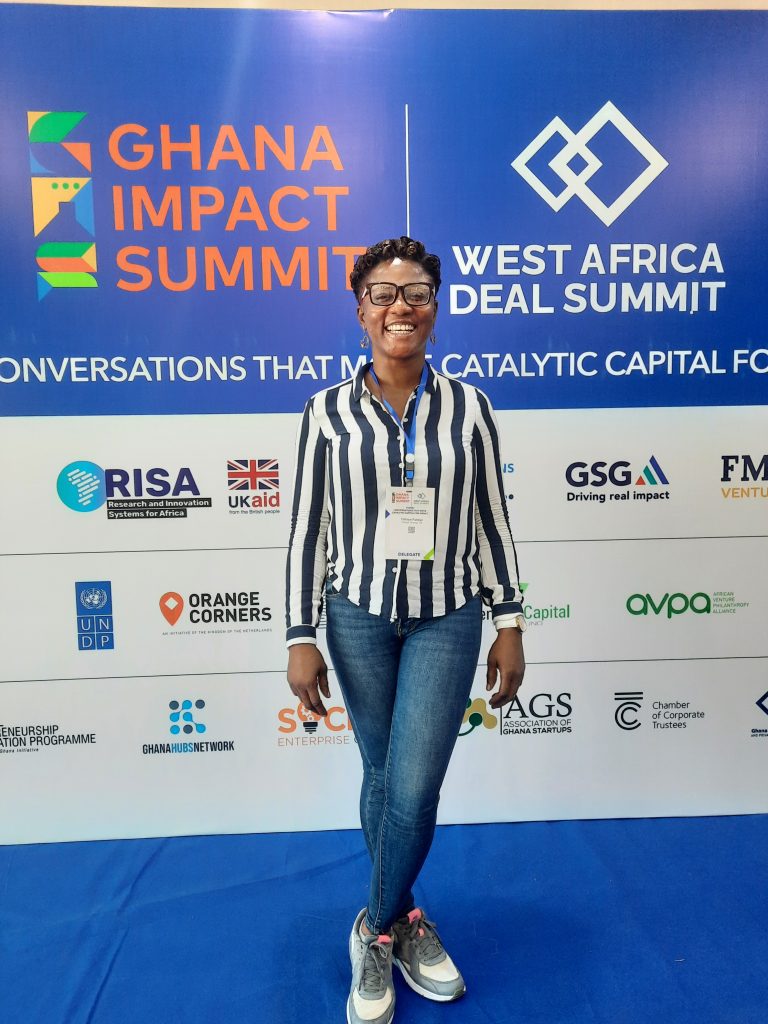
Moving from the media to your current venture. What does Orange Strategy do exactly?
We recycle waste. We collect ten different types of recyclable wastes, ranging from beverage cans, metal, carton and electronic waste to different types of plastics, such as PP, HDPE, plastic bags. We process the plastic waste into flakes by sorting, shredding and cold-washing before selling to off-takers. The idea of cold-washing our plastic flakes is one of our competitive advantages, as we take the product a step further than most other Nigerian waste management firms. By cold-washing our flakes, we get rid of impurities, and this allows us to offer our customers a slightly improved product: clean PET flakes.
As Orange Strategy you’re part of an entire waste management ecosystem. What does this ecosystem look like?
We collect waste in different forms. As much as we’re trying to avoid recyclable waste from getting to the landfill, much still ends up on landfills. We’re partnered with the Nigerian Waste Management Authority to exclusively manage one of the government owned landfills. We have about 78 waste pickers working for us on that landfill, who segregate recyclable waste from general waste.
In addition to that, we also leverage technology for the collection of recyclable waste from households by using a mobile application. We encourage households to segregate their waste from the source, separating recyclable waste from their general waste. In exchange for their recyclable waste, they get tokens, which could be in the form of cash, household items or food items
And thirdly, we also have partnerships with some public schools in Nigeria. We encourage pupils to bring plastic waste to school and in exchange for this plastic, we give them stationaries – to help offset the costs of sending children to school. In some cases, we’ve even helped pay for external exams, in exchange for plastic waste.
And our last source for waste are the mini collection hubs. We help women living below $1 per day set up mini collection hubs within their local community and we encourage them to collect plastic waste and other materials we recycle. We buy this waste from them at the prevailing market price at that time. Orange Strategy has really helped to improve the standard of living for these women, a lot of them can now afford to send their kids to school, for example. On average, we get about 250 kg of plastic waste from a mini collection hub on a weekly basis, and we buy from them at 100 Naira per kg. So someone who hardly earned $1 in a day before now makes as much as much as $25 per week. That’s the icing on the cake for me really! That’s what matters most to me: the joy and the smiles on the faces of these women when we give them value in exchange for their plastic waste.
Seeing the joys and smiles on the faces of the women we buy our waste from is the icing on the cake for me really!
Titilayo Falaiye, founder Orange Strategy
Do you have a particular affinity with that specific group, women living below poverty line?
We currently have four waste recycling facilities, one in Lagos State and three in the neighbouring state, Ogun State. Initially in Lagos we weren’t looking at women empowerment, we were mainly looking at how to get the materials we needed, how to get the maximum volume of plastic waste. When we expanded to Ogun State, we started realising that a lot of women here were living below poverty line. At the same time there was a lot of plastic waste littering the environment and they didn’t know there’s value in this waste. So we decided we’d kill two birds with one stone: we set up mini collection hubs for them and pay them a very good rate. This is a win-win situation, as it gives us access to a larger volume of recyclable waste to run our business, and at the same time it helps these women improve their standard of living. We tried this out with two hubs, and currently there’s 13. Our target is to have 20 mini collection hubs up and running by the last quarter of 2023.
You’re with us today at the West Africa Deal Summit because we see you as an ambitious young entrepreneur who is set to go places. What do you hope to achieve here?
I’m here at the West Africa Deal Summit for a few reasons. One is to meet with investors, to see how we can take our business to a higher level. Personally, I don’t want to sell my seed, I would rather sell my fruit. I’m not sure we’re really ready for equity investments, so we’re leaning more towards debt finance. If we can get a good deal, I mean a very good deal, we’ll definitely go for it, but if we don’t we’re just going to take our time and wait until we’re ready.
And then secondly, I also look forward to networking. I’ve already engaged with a couple of entrepreneurs here in Ghana, we’ve had conversations about how we can collaborate and partner. So outside of the possibility of meeting amazing investors to fund our business, it’s also about networking, partnerships and collaborations for me.
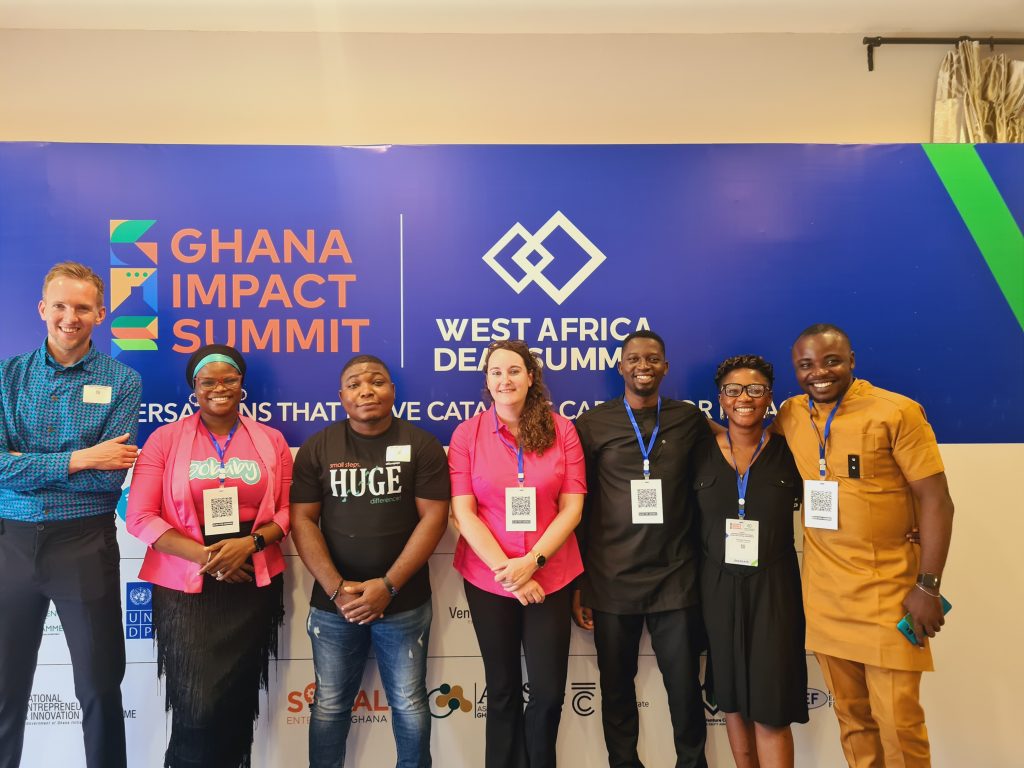
So if you’re looking at maybe five or ten years, where do you see yourself going?
Five years from now, I see Orange Strategy creating value for waste nationwide in Nigeria. Currently we don’t close the loop of plastic waste recycling, because we just collect in bulk and we pre-process by sorting, shredding and cold-washing. But my passion really lies in closing the loop, doing 360 waste recycling for plastic waste by also processing this plastic waste into a commodity that can be used in Nigeria and in Africa at large.
One thing I’m currently looking at is making fire-resistant building blocks out of plastic waste. We’re already in talks with a company from the US who does this, and we’re hoping to bring them to Nigeria and partner with them. So our long-term goal is closing the loop of plastic waste recycling by processing it into a commodity that can be used both locally and internationally.
Our long-term goal is closing the loop of plastic waste both locally and internationally
Titilayo Falaiye
So far we’ve mostly spoken about Nigeria. Do you also see your model as a scalable model that can potentially be exported?
It’s a very scalable business! And we definitely have international ambitions. I’m already in talks with colleagues in South Sudan, the Democratic Republic of Congo (DRC) and Namibia who want to collaborate with Orange Strategy and replicate our idea. This problem of indiscriminate disposal of waste is common practice in Africa. Plus there are also a lot of poor people. And I believe the average poor person will embrace our idea as long as it’s legal and it puts food on the table.
You’re one of the few women on our delegation. What would you say to the next generation of female entrepreneurs, who are still wondering whether they should consider entrepreneurship as a career?
To women who aren’t sure of whether they want to step into the shoes of an entrepreneur I say this all the time: just do it! Start now with whatever resources you have at your disposal, just start! When I mentor women, I go all out. If anyone needs mentorship in this waste recycling business of mine, I don’t mind mentoring for free. I have a lot of mentees right now, all women. Some are undergraduates, some are graduates and some are illiterates. And I’m also thinking of bringing some men on board, to balance gender equality a little. But I’ll go all out at no cost to mentor any female entrepreneur that wants to venture into the waste recycling business in Africa.
I still bless God for what I’ve achieved till date. But all the knowledge I have now, I wish I knew all of this when I was an undergraduate some 10-12 years ago. I wish I had someone back then to hold my hand, to say ‘Okay, let’s navigate through all this together’. And because I didn’t have that, I’m willing to give all this support to the younger generation.
I’ll go all out at no cost to mentor any female entrepreneur that wants to venture into the waste recycling business in Africa
Titilayo Falaiye
How wonderful! To round it off, how did Orange Corners contribute to your success?
Orange Corners Nigeria was the first acceleration programme I applied for and it really set the pace for me. It made me realise that, beyond the business, I needed to develop myself as an individual, develop my own capacity. The programme really helped me, for example to strategise my company properly, in terms of our business model, in terms of mentorship. Orange Corners gave me a very solid background, and I’m still building on these basics.
I can proudly say that when I joined Orange Corners Nigeria in 2021 as part of the 4th cohort I had just one waste recycling facility in Lagos State and we were doing about 15-20 tonnes of plastic waste on a monthly basis. In the course of the programme, we expanded to Ogun State. We currently have four waste recycling facilities in both states and we collect an average of 278 tonnes of recyclable waste monthly. My goal is to process an average of 500 tonnes of recyclable waste on a monthly basis. The market for that is there, we sell both locally and internationally. We can’t even meet the demand of the local market, let alone the international market. So we’re looking at expanding to neighbouring states. Ultimately, we want to have a presence in at least 80% of the states in Nigeria, if not all the states!
Follow Titilayo’s Orange Strategy online:
LinkedIn
Instagram
X

